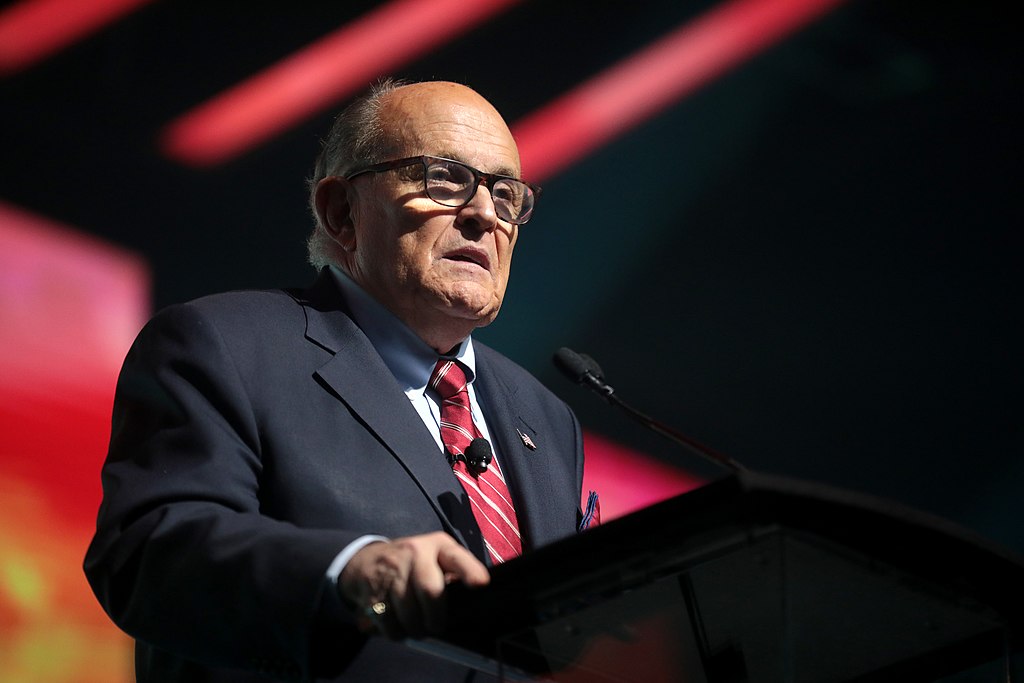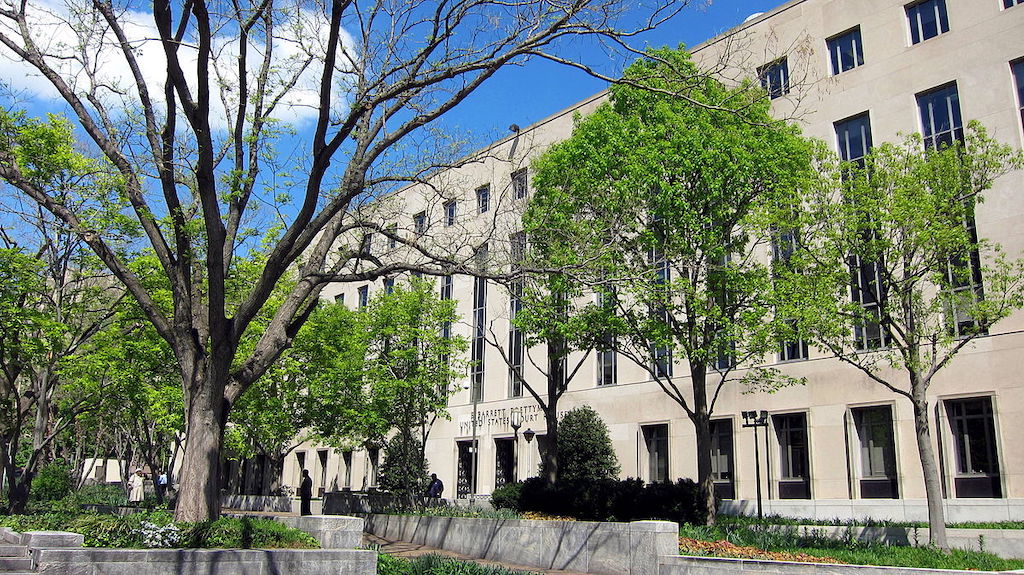Where’s Rudy? A Fulton County Court Wants to Know
Is New York’s former mayor too sick to testify before the special purpose grand jury in Georgia?

Published by The Lawfare Institute
in Cooperation With

It’s half past noon on a Tuesday in Atlanta, and Rudy Giuliani is nowhere in sight.
That would be unremarkable on any other Tuesday. But on this Tuesday—Tuesday, Aug. 9—Giuliani’s conspicuous absence draws a throng of spectators to the eighth floor of the Lewis R. Slaton Courthouse in Fulton County, Georgia, where Judge Robert McBurney will decide if the former mayor of New York should get on the next plane (or train, or bus, or Uber) headed South.
Until today, Giuliani was scheduled to appear before a special purpose grand jury as a part of the Fulton County district attorney’s investigation into Trump and Co.’s 2020 election meddling in Georgia. Then, on Monday, Giuliani sought to delay that appearance, citing medical issues that prevent him from traveling by plane. The district attorney’s office filed a response, alleging that Giuliani had recently traveled to New Hampshire and had purchased plane tickets to Italy and Switzerland. Judge McBurney scheduled a high-noon showdown to sort it all out.
Now, as the clock ticks toward the half-hour mark, the parties enter courtroom 8D. First to arrive is Bill Thomas, a federal prosecutor turned criminal defense attorney whom Giuliani recently retained for local representation in Georgia matters. Thomas, clad in a light gray suit and brown loafers, sits quietly at a table on the left side of the courtroom, waiting for the hearing to begin.
Then the prosecutors make their entrance. To my right, a squad of young men in navy suits marches toward its designated table. Leading the pack of four is Nathan Wade, the special prosecutor who was hand-picked by Fulton County District Attorney Fani Willis to assist with the election probe. As we wait for the judge, Wade and his team huddle together like a high school basketball team, whispering conspiratorially.
The whispering doesn’t last long; it’s all business when McBurney enters the room. Earlier this year, Chief Judge Christopher Brasher appointed McBurney as the special grand jury’s supervising judge. McBurney, a Harvard Law School graduate and former assistant U.S. attorney for the Northern District of Georgia, is no stranger to high-profile cases. In 2018, he presided over the sensational trial of Claud “Tex” McIver, a prominent Georgia lawyer accused of killing his equally prominent wife. And earlier this week, McBurney heard arguments in the state constitutional challenge to Georgia’s “heartbeat” abortion law, which would ban most abortions in the state.
The abortion law is still at the front of McBurney’s mind—sort of. McBurney explains that someone “Zoom bombed” that hearing, which caused a few headaches for the court. So today, McBurney says, the Zoom link can be joined only by the parties, though the public can watch a livestream on YouTube.
With housekeeping matters behind him, McBurney turns to the main event. He recaps how we got here, and then he cuts to the chase: Will Rudy Giuliani be excused from today’s appearance before the special grand jury? The court answers yes. It would be impractical and imprudent, McBurney says, to deny the motion to continue this late in the game.
But he doesn’t let Giuliani completely off the hook: McBurney stresses that the former mayor of New York will be required to appear before the special grand jury. “The purpose of today’s hearing is to sort out when he will be here and in what format,” McBurney says.
McBurney invites Giuliani’s counsel, Bill Thomas, to speak first. After some back and forth about whether McBurney prefers counsel to stand at the podium, Thomas decides he’s more comfortable sitting down. Speaking with a slight Southern drawl, he begins by expounding on his personal lawyering philosophy: work things out before the court gets involved. “Obviously, for whatever reasons, that hasn’t happened here,” he says with a hint of annoyance.
Thomas explains what Giuliani wants the court to do: delay the grand jury appearance until Giuliani receives medical clearance to travel, probably sometime in late September. If the district attorney is unsatisfied with that, Thomas says there are “reasonable alternatives” available. He suggests that Giuliani could appear by Zoom “under conditions that would replicate a grand jury proceeding here in Atlanta, Georgia.” Or prosecutors could conduct a “voluntary interview” with Giuliani, either on Zoom or in New York.
Thomas attempts to dig into other issues, but McBurney cuts him off to make some brief remarks. Pointing to the fact that every other witness has found a way to appear in person, McBurney says that allowing Giuliani to appear on Zoom would be “somewhat extraordinary.” And, McBurney continues, Giuliani’s medical professional only advised against air travel. “One thing we need to explore is whether Mr. Giuliani could get here without jeopardizing his recovery and his health—on a train, on a bus, or Uber.” The thought of Rudy Giuliani traversing the East Coast in an Uber elicits chuckles from the audience.
Finally, McBurney offers remarks on the value of sequencing witnesses in a certain way. Giuliani’s testimony makes sense for what the special grand jury is currently investigating, he says. So, in determining when Giuliani testifies before the grand jury, McBurney will consider dates that are sooner rather than later.
McBurney opens the floor to special prosecutor Nathan Wade. Wade begins by emphasizing that the state is not interested in a Zoom appearance or in an informal interview. McBurney interjects, querying Wade about the difference between a formal and informal interview. As Wade explains it, Giuliani’s New York counsel, Robert Costello, offered a face-to-face, informal meeting with Georgia prosecutors in New York. But, Wade stresses, the district attorney wants Giuliani to personally appear before the grand jury in Georgia. After all, that’s what the court ordered Giuliani to do in the first place.
Then there’s some back and forth about the timeline. According to Wade, Giuliani’s health issues were raised only after the district attorney’s office declined Costello’s offers for a virtual appearance or informal interview. While Thomas attempted to reach out to Wade on Friday, by then it was too late.
Next, Wade describes the district attorney’s skepticism about Giuliani’s medical concerns. While Giuliani has asserted that he has health issues related to a recent cardiac procedure, the medical professional who provided documentation on Giuliani’s behalf is an infectious disease specialist, not a cardiovascular specialist, Wade claims. Further, Giuliani had purchased plane tickets for travel to Europe in July. If Giuliani can travel to Europe, Wade argues, surely he can travel to Georgia.
McBurney reiterates that he already excused Giuliani for today’s appearance; he’s not holding him in contempt. But he wants to know what the district attorney recommends going forward. In response, Wade suggests that Giuliani could be ordered to appear in-person before the grand jury on Aug. 11 or Aug. 17.
Countering the state’s skepticism about Giuliani’s ability to travel by air, Thomas approaches the bench to proffer two exhibits. The first is Giuliani’s passport, which shows he hasn’t traveled out of the country since last fall. Thomas reveals that Giuliani planned to attend an overseas conference in Europe before he underwent cardiac stent surgery in July. Moving on to the second exhibit, Thomas tenders an email exchange. In the exchange, a conference organizer suggests postponing Giuliani’s trip because of his health issues.
Next, Thomas responds to the district attorney’s request for an appearance in Georgia on Aug. 11 or Aug. 17. He cites Giuliani’s health problems, adding that Giuliani requires the assistance of a wheelchair at the airport. “We’re in the same position on August 11 or August 17,” Thomas asserts. Acknowledging that the court could order Giuliani to “travel to Atlanta by Greyhound,” Thomas argues that would be impractical. “It’s not a four-hour trip to New Hampshire, where he’s traveling by private car,” he says.
Thomas pivots, again, to the communication breakdown between Giuliani’s team and the district attorney’s office. “Never in my experience as a prosecutor did the filing of a motion stop negotiations for some accommodations,” he complains. McBurney takes issue with that characterization, noting the “compressed” timeline between Thomas’s first call to Wade on Friday and Giuliani’s scheduled appearance the following Tuesday. Thomas, undeterred, continues to criticize the district attorney’s office.
Finally, Thomas moves to closing, urging the court to make reasonable accommodations for “a 78-year-old man who has health conditions.” As he saunters away from the podium, Wade jumps up to play defense for the district attorney’s office. “It’s not that we weren’t communicating back and forth with the other side, Judge. It’s just that we weren’t agreeing,” he says.
McBurney, remarkably unperturbed by all the bickering, is ready to propose an order. He wants Giuliani to appear before the grand jury on Aug. 17. He’ll have to appear in person, but the later date provides plenty of time for travel, whether “by private coach, or bus, whatever.” He suggests that Giuliani might make the journey over several days: “You know people in D.C., so spend the night there and work your way down,” he says. But he stresses that the order is tentative. If Giuliani’s medical team advises against a gradual journey south, then McBurney will move the date again.
Responding to the proposed order, Thomas briefly shifts the focus to Giuliani’s designation in the investigation. Announcing that he has made “several” inquiries about whether Giuliani is a target of the investigation, Thomas complains that the district attorney’s office has yet to provide an answer. He says the answer to that inquiry “will dictate how things go here if we make the seventeenth.”
“I suspected that would come up today,” McBurney responds. Turning his attention to Wade, he implores the state to clarify Giuliani’s designation prior to Aug. 17. He notes that Wade is well aware of how that designation can impact the nature and extent of a witness’s time before the grand jury. McBurney urges the parties to “keep the channels of communication open.”
Adjourning with a cheerful “Thanks, everyone,” McBurney ends the hearing. Thomas and Wade stand near the center of the courtroom, chatting in hushed tones. Spotting this on his way out, McBurney quips one final directive for the day: “Don’t stop talking to each other. Because that’s apparently rare.”




